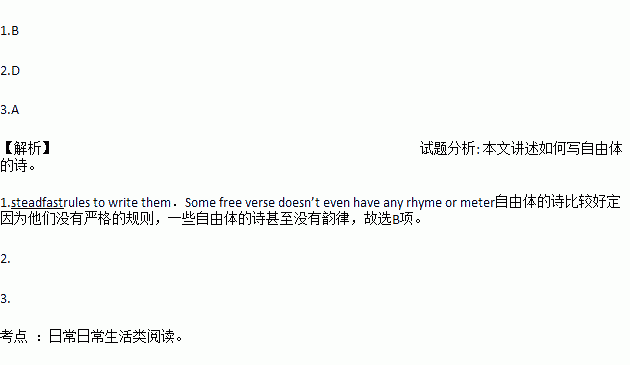题目内容
A poem starts with a thought, an idea, or an emotion felt from the heart.Poems can be happy or sad, deep-thinking or even humorous.The choice is up to you and your imagination as to what you will create.
Your first step is to write down the idea or thought that you have and you want to turn into a poem.Next, you should turn the thought into a free verse(自由诗体)poem.Free verse poems are much easier to write as there are no steadfast rules to write them.Some free verse doesn’t even have any rhyme or meter.
Now, rewrite your thoughts into lines.Now is the time to look at your lines and remember that the poem should have a beginning, a middle, and an end, just like a story, a book, or a movie.
Reread your poem several times and listen to the words and to the rhythm of each line.Now is the time to shorten or lengthen each line in order to create a smooth-sounding poem.Even though it is a free verse poem, you can choose to make each line rhyme with the next line if you want to.
Now go back and reread your poem again. Check for proper punctuation(标点)as well as for the proper spelling of each word. Think up a suitable title for your poem. It would be a good idea to set your poem aside for a while and then return to it later.
Then, reread it again with a fresh mind and make some necessary changes.
If you decided to continue writing poetry, it would be a good idea to investigate(研究) some books about creating poetry, and to attend some local workshops. Check out the available resources on the Internet as well as what is available at your local public library.
1.The underlined word steadfast in Paragraph 2 is similar in meaning to______.
A. advanced B. strict
C. changeable D. reliable
2.In the author’s opinion, what is the right order of writing a good poem?
a.Turn an idea or thought into a poem.
b.Check for proper spelling and think up a title.
c.Rewrite your thoughts into 1ines.
d.Reread it and try to make your poem sound smooth.
e.Rerea d it again with a fresh mind.
d it again with a fresh mind.
f. Write down the idea or thought.
A. a-f-d-b-c-e B. a-f-c-d-e-b
C. f-a-d-c-e-b D. f-a-c-d-b-e
3.What can we infer from the end of the passage?
A. There is still a lot to learn about writing good poems.
B. Poems must depend on the Internet, workshops and libraries.
C. Writing poems is meaningful but rather difficult.
D. Not all people can succeed in writing poems.


 coming its 144th patient.”
coming its 144th patient.”